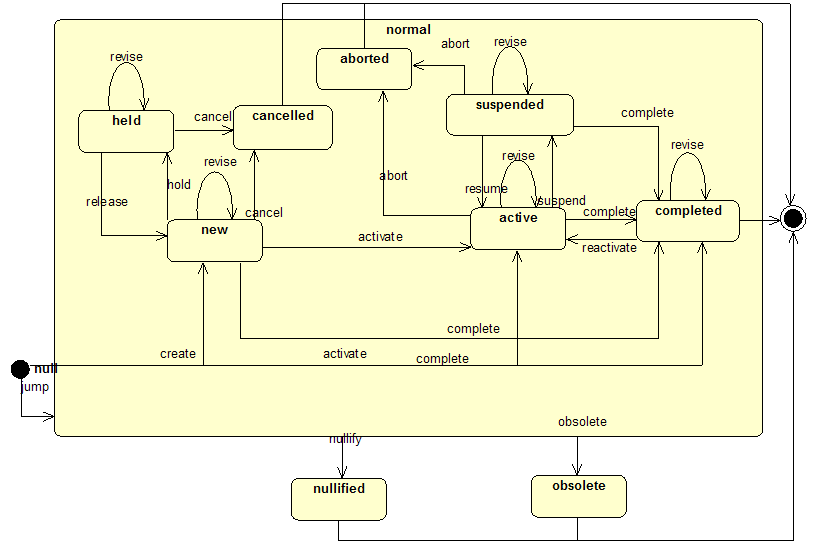This wiki has undergone a migration to Confluence found Here
HL7 RIM References
Jump to navigation
Jump to search
HL7 RIM References
The following diagram is an extract from HL7 RIM reference documentation and illustrates how HL7 defines "healthcare trigger events" and it illustrates the life cycle of a typical healthcare object (e.g. Act).
States of Act (also specified using the ActStatus coding system):
- aborted (sub-state of normal): The Act has been terminated prior to the originally intended completion.
- active (sub-state of normal): The Act can be performed or is being performed.
- canceled (sub-state of normal): The Act has been abandoned before activation.
- completed (sub-state of normal): An Act that has terminated normally after all of its constituents have been performed.
- held (sub-state of normal): An Act that is still in the preparatory stages has been put aside. No action can occur until the Act is released.
- new (sub-state of normal): An Act that has been activated (actions could or have been performed against it), but has been temporarily disabled. No further action should be taken against it until it is released.
- normal: Encompasses the expected states of a service object, but excludes "nullified" and "obsolete" which represent unusual terminal states for the life-cycle.
- nullified: This Act instance was created in error and has been 'removed' and is treated as though it never existed. A record is retained for audit purposes only.
- obsolete: This Act instance has been replaced by a new instance.
- suspended (sub-state of normal): Active service object is temporarily suspended.
State transitions of Act:
- abort (from active to aborted)
- revise (from active to active)
- complete (from active to completed)
- suspend (from active to suspended)
- reactivate (from completed to active)
- revise (from completed to completed)
- cancel (from held to canceled)
- revise (from held to held)
- release (from held to new)
- activate (from new to active)
- cancel (from new to canceled)
- complete (from new to completed)
- hold (from new to held)
- revise (from new to new)
- nullify (from normal to nullified)
- obsolete (from normal to obsolete)
- activate (from null to active)
- complete (from null to completed)
- create (from null to new)
- jump (from null to normal)
- abort (from suspended to aborted)
- resume (from suspended to active)
- complete (from suspended to completed)
- revise (from suspended to suspended)
